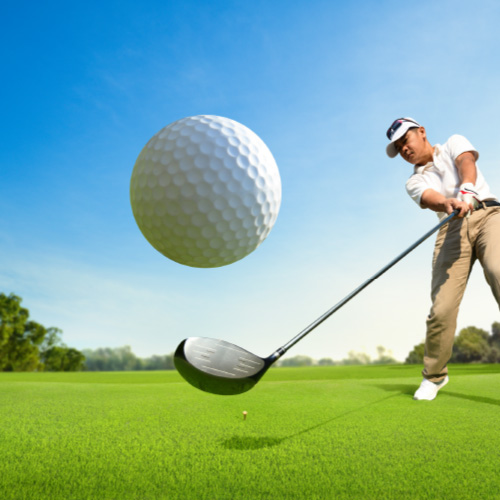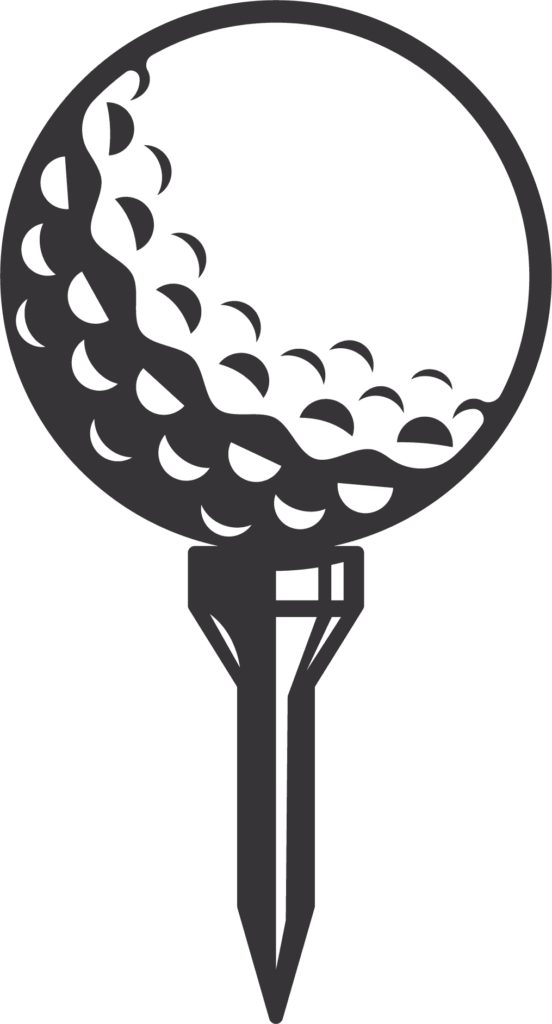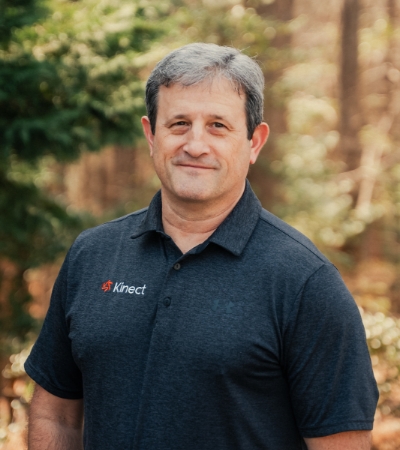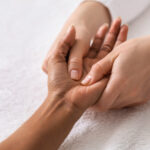
PT Can Help Alleviate Shoulder Pain in Golfers
Have you noticed pain while swinging your golf clubs? Are you struggling to get a full swing due to pain or restrictions in motion? Maybe it’s time for you to get your shoulder looked at by one of our movement experts. At Kinect Physiotherapy, our physical therapists help golfers alleviate pain, recover lost motion, and get stronger so they can golf without limitations!
Shoulder pain can be a significant struggle for golfers of all ages and skill levels. Research has indicated that shoulder problems account for up to 18% of all golf-related injuries. Like most golf-related injuries, shoulder conditions are typically overuse injuries. They are typically the result of repetitive microtrauma, poor swing mechanics, or an aggravation of a previous condition.
Caring for golfers requires comprehensive knowledge of the golf swing mechanics and musculoskeletal injuries specific to golfers. Ensuring the golfer optimizes their unique anatomy to create efficient motor patterns is the key to pain-free golfing.
Our physical therapists will identify deficits such as weakness and/or tightness in the leg, pelvic/spine, shoulder joint, or shoulder blade that can lead to overuse injuries. At Kinect Physiotherapy, we will assess your whole body to determine what may be contributing to your pain/injury. We will identify your individual needs and help you resolve your problem once and for all!
Request an appointment today and let our team help guide you back to health!

What Are The Main Types Of Shoulder Injuries From Golfing?
Although the temptation is often to rest or alter the painful swing movement, a better solution would be to see one of our highly trained physical therapists. Golf can be demanding due to the sheer volume of swings in a single round of golf.
The shoulder is commonly affected by overuse and/or poor technique. The lead shoulder, or the left shoulder in the right-handed golfer, is particularly susceptible to injury. Most injuries can be treated or prevented through a thorough understanding of the biomechanics of the swing and how the entire body contributes to a successful swing.
The most common shoulder problems affecting golfers include:
Rotator cuff tears and/or tendinopathy: The rotator cuff comprises four muscles that keep the humeral head (ball) centered in the socket when we move our arm. Injury or irritation of one or more tendons leads to shoulder pain, weakness, and loss of range of motion.
Shoulder impingement: Impingement is a common cause of shoulder pain, where a tendon rubs or catches on nearby tissue and/or bone as you move (lift) your arm. This problem is usually due to overuse and repetitive traumas.
The long head of the biceps tendon is particularly susceptible to impingement as it runs along the shoulder’s front (anterior) aspect through the area between the shoulder blade and arm bone (i.e., subacromial space).
Acromioclavicular (AC) joint pain: The AC joint is on the very top of the shoulder. Research suggests that the AC joint is most stressed at the top of the backswing when the lead shoulder is in maximal horizontal abduction (reaching across the body). Degeneration, poor posture, and faulty shoulder blade movements can influence the AC joint and lead to pain or injury.
Osteoarthritis: Osteoarthritis is a degenerative type of arthritis where the cartilage in the shoulder joints gradually wears away. As the cartilage wears away, the joint space decreases, resulting in pain and loss of motion.
Shoulder joint instability: Instability is defined as the excess movement of the humeral head (ball) in relation to the socket. Essentially, the ball slides forward or backward in the socket and loses congruence with the socket. The rotator cuff’s primary function is to maintain the ball in the center of the socket, preventing excessive movement of the humeral head in any direction.
At Kinect Physiotherapy, our physical therapists will help identify the most likely cause of your shoulder pain and how to resolve it.
What To Expect In Physical Therapy
We will conduct a comprehensive evaluation that includes a thorough history and movement assessment of the shoulder, spine, and hips in particular. We will identify how your joints move in relation to one another to ensure we identify any restriction or limitation that may be contributing to your condition.
In addition, we will test your shoulder and shoulder blade strength, range of motion, and how they work together in different positions. This information will help determine any weaknesses and/or compensations that may impair your ability to swing correctly.
Your physical therapist will design a program tailored to your individual needs. This program will consist of flexibility/mobility, strength, and power training to correct faulty movement patterns to help resolve your injury and improve your overall performance.
We will use any technique, including Kinesio Taping and manual techniques, to assist your rehabilitation and education on proper movement sequencing. Our team will show you how to warm up, including mobility and theraband work, to enhance your performance so you can hit the ball with greater confidence!

Request An Appointment At Kinect Physiotherapy Today!
Our physical therapists are highly skilled at treating golfers. No matter what is causing your shoulder pain, we offer the results you are looking for!

Say Goodbye to Pain – Get Started with PT Now!
Ready to feel your best again? Come back to Kinect Physiotherapy and let us help you achieve your wellness goals—book your appointment today!

4 Benefits of Spring Cleaning
Have you been putting off spring cleaning? If so, you certainly aren’t alone. With your hectic schedule, it can be easy to overlook this essential activity.
However, there are many reasons why you should include spring cleaning into your routine. Here are 4 good reasons to make time for spring cleaning this season.
1. A clean home is better for your immune system
Mold, dust, and pet dander can accumulate in your home during the colder months when there is less opportunity for air circulation. A deep dive into spring cleaning helps to air out your home, preventing respiratory issues.
2. It’s an easy way to get active
Cleaning can be a real workout! From sweeping the floors to scrubbing tile to moving around furniture, spring cleaning can help you get active. Exercise has numerous benefits, including stress reduction and better heart health.
3. It improves concentration and mood
Studies show that a clean home positively affects your daily mood and ability to focus/complete tasks. Now that so many of us work from home, this has never been more important!
4. You can donate unused items to others
Part of cleaning is going through old and unused items to see what can find a new home. Not only is donating to charity emotionally rewarding, it helps free up space in your home and can encourage you to become more organized.
With so many benefits to spring cleaning, what are you waiting for? Get started today!

Patient Success

“First off, everyone is very nice. Justin has been working with me after I had a Right Reverse Shoulder Arthroplasty with Biceps Tenodesis Regional Block by Dr. Ryan Tarr. Justin is doing a great job with helping me get the use back in my arm and shoulder. I feel so lucky to be doing as well as I am. Thank you Dr. Tarr and Justin Mitchell from Kinect!!!”-Barbara Y.
Seasonal Recipe
Cherry-Berry Oatmeal Smoothies
- ⅓ cup quick-cooking rolled oats
- ½ cup light almond milk
- ¾ cup fresh strawberries
- ½ cup fresh dark sweet cherries
- 1-2 tbsp almond butter
- 1 tbsp honey
- ½ cup small ice cubes
Directions:
In a medium bowl combine water and oats. Microwave 1 minute. Stir in ¼ cup of the milk. Microwave 30 to 50 seconds more or until oats are very tender. Cool 5 minutes. In a blender combine oat mixture, the remaining ¼ cup milk, and the next four ingredients (through honey). Cover and blend until smooth, scraping container as needed. Add ice cubes; cover and blend until smooth. If desired, top each serving with additional fruit.
Thank You for Subscribing to Kinect Physiotherapy
Staff Spotlight: Kaitlyn Walters, Intake Coordinator Receptionist
Kaitlyn is our dedicated Intake Coordinator and Receptionist at Kinect Physiotherapy. With a passion for helping others, she ensures a seamless and welcoming experience for every patient. Her friendly demeanor and attention to detail make her an invaluable part of our team.


Share Your Success Story
Love your experience with Kinect Physio? Click the button to leave us a Google review—your feedback helps others find the care they need!
Refer a Friend

Our purpose at Kinect Physiotherapy is to leave a greater impact on the community around us. In order to achieve our goal we want to change as many lives as possible as we become a beacon of positivity in our community.















